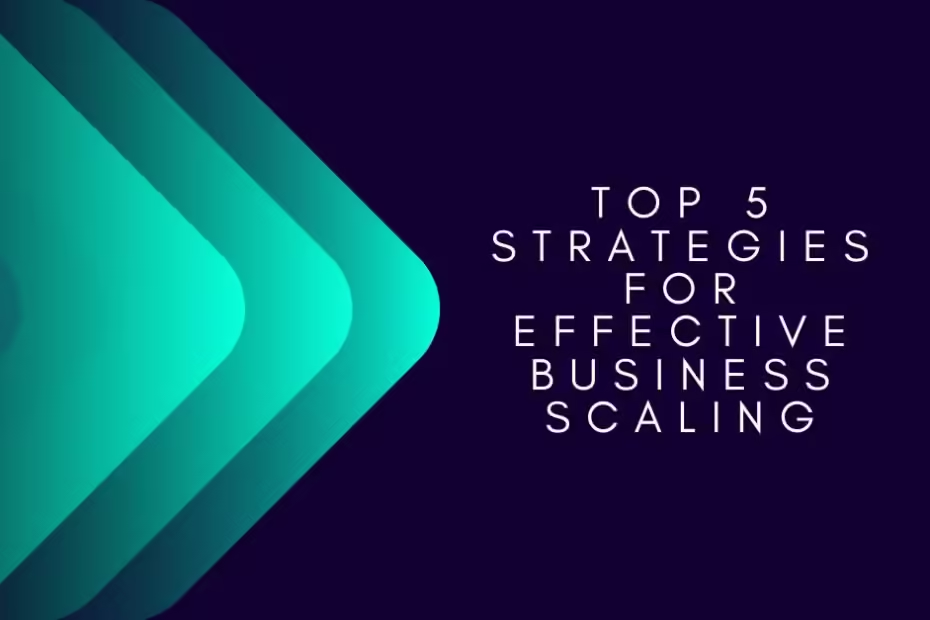Effective Business Scaling
Scaling a business is a complex yet rewarding endeavor. As companies grow, they encounter new opportunities and challenges that require strategic planning and execution. Effective scaling not only involves expanding your market reach but also optimizing processes to maintain profitability and operational efficiency. This blog explores the top five strategies for scaling your business effectively, integrating key SEO principles to enhance online visibility and attract potential customers.
1. Develop a Robust Business Model
Before scaling, ensure that your business model is solid and scalable. A robust business model outlines how your company will create, deliver, and capture value. It should be adaptable to changing market conditions and capable of supporting increased demand.
Key Considerations:
- Market Research: Conduct thorough research to understand your target market, customer needs, and competitive landscape. This insight will guide your scaling strategy and help you identify growth opportunities.
- Value Proposition: Clearly define your unique value proposition (UVP) to differentiate yourself from competitors. A strong UVP will resonate with your target audience and drive customer loyalty.
Example: A subscription-based software company with a scalable model can expand its customer base by leveraging digital marketing and partnerships while maintaining consistent service quality.
2. Optimize Your Online Presence with SEO
An effective SEO strategy is crucial for increasing your online visibility and attracting potential customers. By optimizing your website and content, you can improve your search engine rankings and drive organic traffic to your site.
SEO Best Practices:
- Keyword Research: Identify and target relevant keywords related to your products or services. Use tools like Google Keyword Planner, SEMrush, or Ahrefs to find high-traffic keywords with low competition.
- On-Page Optimization: Ensure that your website’s meta tags, headers, and content are optimized for targeted keywords. Create high-quality, engaging content that provides value to your audience and includes relevant keywords naturally.
- Technical SEO: Optimize your website’s loading speed, mobile-friendliness, and site structure. Implement proper internal linking and ensure that your site is free of technical errors that could hinder search engine crawling and indexing.
Example: An e-commerce business that focuses on SEO can improve its rankings for keywords like “best business scaling strategies” and attract more qualified leads through organic search.
3. Leverage Technology and Automation
Technology and automation are essential for scaling efficiently and effectively. By leveraging digital tools and platforms, you can streamline operations, reduce manual tasks, and enhance productivity.
Key Technologies:
- Customer Relationship Management (CRM): Use CRM systems to manage customer interactions, track sales, and automate marketing campaigns. A CRM helps you build strong customer relationships and improve sales processes.
- Enterprise Resource Planning (ERP): Implement ERP software to integrate and manage key business functions, such as finance, supply chain, and human resources. ERP systems provide real-time data and insights to support informed decision-making.
- Marketing Automation: Automate marketing tasks such as email campaigns, social media posting, and lead nurturing. Marketing automation tools help you reach a larger audience and personalize your marketing efforts.
Example: A growing SaaS company that utilizes CRM and marketing automation can efficiently manage customer data, automate follow-ups, and scale its marketing efforts without additional resources.
4. Expand Your Market Reach Strategically
Expanding your market reach is a crucial aspect of scaling your business. Explore new markets, diversify your product offerings, and consider strategic partnerships to drive growth.
Market Expansion Strategies:
- Geographic Expansion: Enter new geographic markets to reach a broader audience. Conduct market research to understand regional preferences and adapt your offerings accordingly.
- Product Diversification: Introduce new products or services that complement your existing offerings. Diversification can attract new customers and increase revenue streams.
- Strategic Partnerships: Partner with other businesses or influencers to expand your reach and leverage their networks. Collaborations can provide access to new markets and enhance your brand’s credibility.
Example: A tech startup that partners with established industry players and expands into international markets can accelerate growth and gain access to new customer segments.
5. Focus on Customer Experience and Retention
Providing exceptional customer experience and focusing on retention are essential for sustainable business growth. Happy customers are more likely to become repeat buyers and brand advocates.
Customer Experience Strategies:
- Personalization: Tailor your interactions with customers based on their preferences and behavior. Use data to create personalized experiences that resonate with your audience.
- Customer Support: Offer excellent customer support through multiple channels, including chat, email, and phone. Timely and effective support enhances customer satisfaction and loyalty.
- Feedback and Improvement: Collect feedback from customers to identify areas for improvement. Use insights to enhance your products, services, and overall customer experience.
Example: A retail business that invests in personalized customer experiences and provides exceptional support can build a loyal customer base and drive repeat sales.
Conclusion
Scaling a business effectively requires a combination of strategic planning, technological integration, and a focus on customer satisfaction. By developing a robust business model, optimizing your online presence with SEO, leveraging technology and automation, expanding your market reach, and prioritizing customer experience, you can achieve sustainable growth and maximize profit margins.
Incorporating these strategies into your scaling plan will position your business for success in the competitive digital landscape. Embrace innovation, stay agile, and continually refine your approach to scaling for long-term profitability and growth.
By implementing these best practices, businesses can navigate the complexities of scaling and unlock new opportunities for success. Stay ahead of the curve, adapt to changing market dynamics, and drive growth with confidence.

